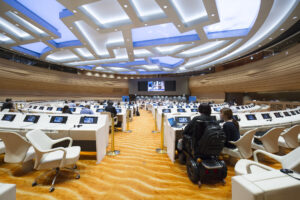At the end of an erratic Commission on Human Rights, the ICJ said that structural reform of the UN human rights system must be built on the foundation of political will to tackle the worst human rights situations around the world.
“This year showed that when states have the political will they can make a difference”, said Nicholas Howen, Secretary-General of the ICJ. “But this Commission also showed it is incapable of holding to account the most powerful states and those protected by their peers.”
The Commission seriously addressed the human rights crisis in Nepal, finally agreed to begin scrutinizing counter-terrorism measures that threaten human rights and made significant achievements in agreeing international standards on reparations for victims and on ending impunity. The Commission has also begun to consider the human rights accountability of business.
Yet the Commission dismally failed hundreds of thousands of victims, from China, Iran and Iraq, to Russia (Chechnya), Zimbabwe and those affected by the United States’ “war on terror”.
“Above all, while crimes against humanity were being committed in Darfur, the Africans and Europeans could only argue whether to commend or condemn the Government of Sudan, at the last minute agreeing to a compromise that feebly glosses over the responsibility of perpetrators,” said Nicholas Howen.
“The five permanent members of the Security Council are still untouchable. And regional blocks of states still protect some of the worst violators in their ranks,” he added.
“We do need reform, and to replace the Commission with a new human rights body that can meet anytime and has a higher position in the UN system. Rhetoric for change is in the air and all agree the Commission is highly selective,” said Nicholas Howen,
“But reforming the structure will mean little unless states can show they have the political will to deal consistently with the gravest human rights situations, wherever they are,” he warned.
In a major breakthrough led by Switzerland, the Government of Nepal agreed to a new field operation of the High Commissioner for Human Rights, strongly mandated to protect human rights around the country. The Commission, as guarantor of this agreement, adopted a potent resolution highlighting grave human rights abuses committed by the Nepali security forces and Maoist insurgents and setting benchmarks for change.
Thanks to the persistence and leading role of Mexico, the Commission finally moved to address the human rights impact of ill-conceived counter-terrorism practices. A Special Rapporteur will monitor official conduct, seek to prevent abuse, and provide advice to states on to how to implement counter-terrorism measures in conformity with their human rights obligations.
But when it came to addressing concrete abuses in the name of the “war on terror”, states once again showed that political gamesmenship dominates. The initiative of Cuba on the detainees at Guantanamo Bay, who have been neglected by all member states over the past three years, was a mere political move without any real intent to protect the victims, leaving them yet again in the black hole created by the United States.
Meanwhile, political gamesmenship, this time between the European Union and Arab states, also thwarted clear criticism of illegal Israeli settlements in the Occupied Palestinian Territories.
The Commission also again shamefully abandoned those who suffer human rights violations because of their sexual orientation or gender identity. As highlighted by New Zealand, speaking on behalf of 33 countries, for the Commission “to remain silent” on this question “is to condone some of the worst forms of discrimination.” Still, no state, in the face of obstruction by the group of Islamic states and the Vatican, opted to break the silence by introducing a resolution.
Beyond their obsessive opposition to the International Criminal Court, the United States relentlessly sought to blunt progress in international human rights law or undermine existing standards, especially in relation to the applicability of human rights law in times of war, the absolute prohibition of cruel, inhuman and degrading treatment and sexual and reproductive rights. The US again revealed itself as the only state in the world not to accept the validity of economic, social and cultural rights, as the lone dissenter in 52-1 votes on the rights to food and health.
The members of the African Group frequently protest the double standards of Western states. Yet they abdicated their responsibility to deal seriously with the catastrophe in Sudan and continued to protect Zimbabwe from even mild scrutiny.
While the European Union (EU) played a determined role in ensuring continuing effective scrutiny of Colombia, members also settled for diluted versions of its thematic resolutions in an attempt to forge an artificial “consensus.” Denmark, for example, accepted the weakening of its draft resolution on torture, at a time when the absolute prohibition of cruel, inhuman and degrading treatment is being actively undermined.
“What we need is not only fundamental reform of the UN human rights system, but also reform of the attitude of states,” concluded Nicholas Howen.




